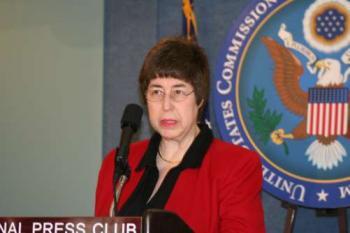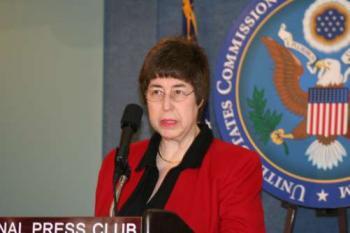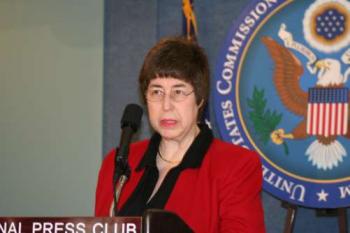WASHINGTON—The U.S. Commission on International Religious Freedom (USCIRF) added five countries—Pakistan, Iraq, Nigeria, Turkmenistan, and Vietnam—to its list of “countries of particular concern,” or CPC, for their continuous, systematic, and egregious violations of religious freedom.
Burma, North Korea, Eritrea, Iran, China, Saudi Arabia, Sudan, and Uzbekistan were carried over as designated CPCs from last year. The Department of State (DOS) has also designated these eight countries as CPCs since September 2004 or before.
USCIRF released its findings on Friday at the National Press Club. Their annual report gives particular emphasis on violations of religious freedom in each of the CPC, as well as in countries on a “Watch List.” These latter countries do not rise to the level of the CPC, but, nonetheless, need to be monitored closely and, in some cases, are targeted for diplomatic action.
USCIRF is recommending that the five nations named above be added to the CPC list used by the U.S. Department of State. How and when the State Department will respond to the USCIRF recommendations is anyone’s guess. The Commission expressed some frustration at the lack of any CPC designations by the State Department between November 2006 and January 2009.
When the State Department does designate a country as CPC, the secretary of State is required by law to enter into consultations with that government to find a way to bring about remedying the situation. Sanctions are an option, such as restrictions on normal trade relations that we impose on North Korea.
The Commission’s report describes heinous violations of religious freedom and belief in countries on their CPCs and Watch List: Jews in Venezuela; Baha’is in Iran and Egypt; Buddhist monks in Burma; Christians in Iraq, Sudan, and Nigeria; Ahmadis in Indonesia and Pakistan; Shi’a Muslims in Saudi Arabia; Muslims in Tajikistan; minority religious groups in Afghanistan, Laos, Turkey, Egypt, and Russia; and severe restrictions for all or nearly all religions and spiritual groups in communist countries (China, North Korea, Vietnam, and Cuba).
USCIRF is a federal government commission—independent and bipartisan—that advises the administration and Congress on protecting and fostering the cause of religious freedom and belief worldwide. It was created by the International Religious Freedom Act in 1998 to advise the president, secretary of State, and Congress.
Although the president appoints 3 of the 10 commissioners, access to the president is apparently difficult. In the open letter on the first page of the report to the president signed by the chair of USCIFR, it states “The Commission would welcome the opportunity to discuss the Annual Report with you.”
The Commission does not just produce a report and passively stand back; it actively promotes and agitates for its policy recommendations, holding special hearings, press conferences, and articulating its displeasure with policies of the U.S. government that affect religious liberty, such as when Secretary Clinton recently stated that human rights would not be a high priority in her talks with China’s leaders.
“In the areas [the Taliban-associated extremists] already control, these groups are imposing draconian restrictions on human rights and religious freedom and engaging in brutal acts against individuals, particularly women and local police, who refuse to accede to their repressive policies.”
The Pakistani authorities ceded control in the SWA valley to “armed insurgents espousing a radical Islamist ideology,” that imposes its extreme version of sharia (Islamic law), says the report. The government fosters sectarian violence against Shi’a Muslims, Ahmadis, Christians, and Hindus. The perpetrators of violence against these minorities are seldom brought to justice, according to the report.
Burma, North Korea, Eritrea, Iran, China, Saudi Arabia, Sudan, and Uzbekistan were carried over as designated CPCs from last year. The Department of State (DOS) has also designated these eight countries as CPCs since September 2004 or before.
USCIRF released its findings on Friday at the National Press Club. Their annual report gives particular emphasis on violations of religious freedom in each of the CPC, as well as in countries on a “Watch List.” These latter countries do not rise to the level of the CPC, but, nonetheless, need to be monitored closely and, in some cases, are targeted for diplomatic action.
USCIRF is recommending that the five nations named above be added to the CPC list used by the U.S. Department of State. How and when the State Department will respond to the USCIRF recommendations is anyone’s guess. The Commission expressed some frustration at the lack of any CPC designations by the State Department between November 2006 and January 2009.
When the State Department does designate a country as CPC, the secretary of State is required by law to enter into consultations with that government to find a way to bring about remedying the situation. Sanctions are an option, such as restrictions on normal trade relations that we impose on North Korea.
The Commission’s report describes heinous violations of religious freedom and belief in countries on their CPCs and Watch List: Jews in Venezuela; Baha’is in Iran and Egypt; Buddhist monks in Burma; Christians in Iraq, Sudan, and Nigeria; Ahmadis in Indonesia and Pakistan; Shi’a Muslims in Saudi Arabia; Muslims in Tajikistan; minority religious groups in Afghanistan, Laos, Turkey, Egypt, and Russia; and severe restrictions for all or nearly all religions and spiritual groups in communist countries (China, North Korea, Vietnam, and Cuba).
USCIRF is a federal government commission—independent and bipartisan—that advises the administration and Congress on protecting and fostering the cause of religious freedom and belief worldwide. It was created by the International Religious Freedom Act in 1998 to advise the president, secretary of State, and Congress.
Although the president appoints 3 of the 10 commissioners, access to the president is apparently difficult. In the open letter on the first page of the report to the president signed by the chair of USCIFR, it states “The Commission would welcome the opportunity to discuss the Annual Report with you.”
The Commission does not just produce a report and passively stand back; it actively promotes and agitates for its policy recommendations, holding special hearings, press conferences, and articulating its displeasure with policies of the U.S. government that affect religious liberty, such as when Secretary Clinton recently stated that human rights would not be a high priority in her talks with China’s leaders.
Pakistan: Religious Extremism Threaten Religious Freedom and Security
Felice Gaer, chair of USCIRF, connected the events unfolding in Pakistan with the theme of the 2009 report:“In the areas [the Taliban-associated extremists] already control, these groups are imposing draconian restrictions on human rights and religious freedom and engaging in brutal acts against individuals, particularly women and local police, who refuse to accede to their repressive policies.”
The Pakistani authorities ceded control in the SWA valley to “armed insurgents espousing a radical Islamist ideology,” that imposes its extreme version of sharia (Islamic law), says the report. The government fosters sectarian violence against Shi’a Muslims, Ahmadis, Christians, and Hindus. The perpetrators of violence against these minorities are seldom brought to justice, according to the report.






